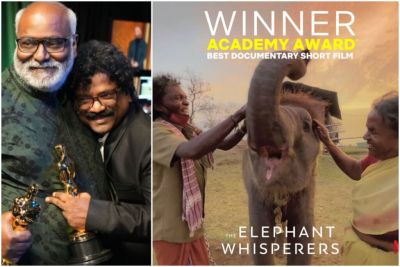
Thanks to the Oscars, two documentaries from India- ‘The Elephant Whisperers’ and ‘All That Breathes’– have been in the news for a while now. But what exactly are documentaries? Let's find out.
‘The Elephant Whisperers’, set in an elephant camp in Tamil Nadu, follows tribal couple Bellie and Bomman. Their lives are deeply connected by their shared love for Raghu, an orphaned wild baby elephant who appears to have had no hope for survival till the two take him into their fold and ply him with food and generous doses of loving care. When it's time for Raghu to move on, he breaks those two hearts. But as it is with most things in life, the couple is left with Raghu's memories to hold on to and new love to look forward to. While documenting the life of Raghu, ‘The Elephant Whisperers’ also allows us quiet glimpses of life in a tribal hamlet and the wildlife surrounding it-all in 40-odd minutes. Directed by Kartiki Gonsalves, this profoundly touching story was nominated for the Oscar under the Documentary Short Film category.
Set in our bustling national capital, ‘All That Breathes’ tells the story of brothers Nadeem Shehzad and Mohammad Saud who have taken it upon themselves – for about two decades- to care for raptors, particularly black kites, suffering the city's notorious pollution. Even as it records how the brothers go about their task – without substantial help in cash or kind, ‘All That Breathes’ unobtrusively brings into focus social issues intersecting the duo's lives, outlining the fact that it's not just air that's toxic. And, despite everything that's going on, what dominates the tone of the film is the strength of compassion and the intrinsic interconnectedness in our world. Nominated for the Oscar under the Documentary Feature Film category, it has been directed by Shaunak Sen.
What is a documentary?
A documentary is a film either screened in cinema halls or telecast on television channels in one or many parts over a period of time Today documentaries are available for viewing on video streaming platforms too. The defining tenor of any documentary is its rootedness in truth and reality. While the director may take creative liberty with the work, a documentary always revolves around facts. It aims to bring together several aspects of the subject in focus. The subject could be anything from nature and society to social issues and personalities, the possibilities are endless. Importantly, since it strives to capture reality, any documentary-irrespective of its subject-involves a lot of research and reflects a tireless quest for accuracy.
How is it different from a film?
A film, or more precisely, a feature film, may or may not be anchored in reality. Invariably, feature films are fictitious, and cover a wide range of genres-from family drama, romance, and sci-fi to fantasy, action, and adventure. In fact, many of them created in India even involve song and dance sequences. Some such films may even feature characters doing what is impossible for individuals in real life. In short, feature films could be worlds of make-believe, a far cry from what a documentary feature film stands for. But, thanks to better reach, interest, and acceptance among film-goers over the years and constant advancement in technology, feature films moored in reality too are gaining increased endorsement the world over. Another factor of difference is that while feature films predominantly aspire to entertain, documentaries hope to inform and educate. (However, this does not suggest that feature films will not educate or that documentaries will not entertain.) The run time too is taken into account while defining a film particularly when it comes to award categories. For instance, a short documentary could be defined as one that runs for a certain duration, and anything running longer than that could be slotted under ‘Documentary Feature Film’.
Why are documentaries important?
Because they inform. And bring in varied perspectives on the subject they deal with. Especially with social issues, they help start conversations on topics that people have either forgotten about or are unwilling to talk about. They ask questions that many are uncomfortable asking. They seek to find answers on behalf of those who may not have the wherewithal to do so. Be it about our history, our culture, the natural world, or society in general, documentaries help kindle our interest/curiosity, call us to learn, inspire us to understand, and nudge us to act, if need be. They also have the social responsibility to be honest and balanced in what they put out to the world.
Picture Credit : Google




